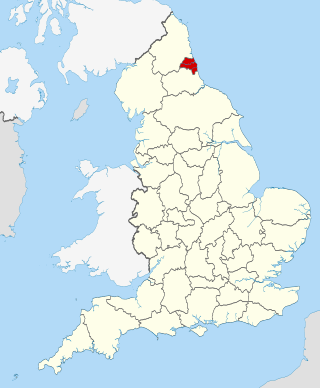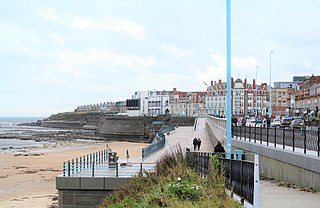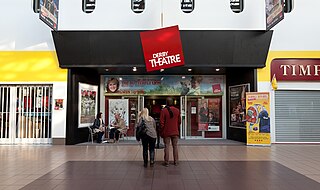
Newcastle upon Tyne, or simply Newcastle, is a city and metropolitan borough in Tyne and Wear, England. The city is located on the River Tyne's northern bank and forms the largest part of the Tyneside built-up area. Newcastle is also the most populous city of North East England. Newcastle developed around a Roman settlement called Pons Aelius and the settlement later took the name of a castle built in 1080 by William the Conqueror's eldest son, Robert Curthose.

Tyne and Wear is a metropolitan county in North East England, situated around the mouths of the rivers Tyne and Wear. It was created in 1974, by the Local Government Act 1972, along with five metropolitan boroughs of Gateshead, Newcastle upon Tyne, Sunderland, North Tyneside and South Tyneside. It is bordered by Northumberland to the north and Durham to the south; the county boundary was formerly split between these counties with the border as the River Tyne.

Whitley Bay is a seaside town in the North Tyneside borough in Tyne and Wear, England. It formerly governed as part of Northumberland and has been part of Tyne and Wear since 1974. It is part of the wider Tyneside built-up area, being around 10 miles (16 km) east of Newcastle upon Tyne. Two notable landmarks are the Spanish City and St. Mary's Lighthouse, the latter on a small island near the town.

The Crucible Theatre is a theatre in Sheffield, South Yorkshire, England which opened in 1971. Although it hosts regular theatrical performances, it is best known for hosting professional snooker's most prestigious tournament, the World Snooker Championship, which has been held annually at the venue since 1977. Its name is a reference to the local steel industry. In May 2022 plans were unveiled to build a new 3,000-seater venue nearby with a bridge connecting the two buildings.

North Shields is a town in the Borough of North Tyneside in Tyne and Wear, England. It is 8 miles (13 km) north-east of Newcastle upon Tyne and borders nearby Wallsend and Tynemouth.

Live Theatre, formerly Live Theatre Company, is a new writing theatre and company based in Newcastle upon Tyne, England. As well as producing and presenting new plays many of which go on to tour nationally and internationally, it seeks out and nurtures creative talent and runs a large education programme for young people.

The Theatre Royal is a historic theatre, a Grade I listed building situated on Grey Street in Newcastle upon Tyne.

The Northcott Theatre is a theatre situated on the Streatham Campus of the University of Exeter, Exeter, Devon, England. It opened in 1967 and was run until 2010 by the Northcott Theatre Foundation, when the company ceased operating after a period in administration. The theatre is now known as Exeter Northcott Theatre and became a registered charity in June 2013.

Longbenton is a district of North Tyneside, England. It is largely occupied by an extensive estate originally built as municipal housing by Newcastle City Council in the 1930s and extended in the 1950s. It is served by the Tyne and Wear Metro stations Longbenton Metro station and Four Lane Ends Metro Station. Nearby places are Killingworth, Forest Hall, Four Lane Ends, West Moor, Heaton and South Gosforth, in Newcastle upon Tyne. The Longbenton and Killingworth Urban Area had a population of 34,878 in 2001. This figure increased to 37,070 in 2011.

Leeds Playhouse is a theatre in the city centre of Leeds, West Yorkshire, England. It opened in 1990 in the Quarry Hill area of the city as the West Yorkshire Playhouse, successor to the original Leeds Playhouse, and was rebranded in June 2018 to revert to the title "Leeds Playhouse". It has two auditoria and a studio space, hosts a wide range of productions, and engages in outreach work in the local community.

The Great North Museum: Hancock is a museum of natural history and ancient civilisations in Newcastle upon Tyne, England.
TAG Theatre Company is a theatre company established in 1967 in Glasgow, Scotland as the outreach arm of the Citizens' Theatre in Glasgow, and was known as the Citizens' Theatre for Youth.

Canberra Theatre Centre (CTC), also known as the Canberra Theatre, is the Australian Capital Territory’s central performing arts venue and Australia’s first performing arts centre, the first Australian Government initiated performing arts centre to be completed. It opened on 24 June 1965 with a gala performance by the Australian Ballet.

The Tyne Theatre and Opera House is a theatre in Newcastle upon Tyne, England. It is a Grade I listed building[1], rated "in the top 4% of listed buildings" by English Heritage and is afforded a three star rating by the Theatres Trust, "a very fine theatre of the highest theatrical and architectural quality". It opened in 1867 as the Tyne Theatre and Opera House, designed by the Newcastle upon Tyne architecture practice of William Parnell. The backstage area was damaged by fire in 1985, with subsequent rebuilding restoring the Victorian stage machinery.

Derby Theatre is a theatre situated in Derby, England, located within the Derbion shopping centre. Formerly known as the Derby Playhouse, it was owned and run by Derby Playhouse Ltd from its opening in 1975 until 2008, when the company ceased operating after a period in administration. The theatre was reopened in 2009 as the Derby Theatre under the ownership of the University of Derby, who use it as a professional and learning theatre. In addition to the 531 seat main auditorium, the building contains a 110-seat studio theatre.

The Tyneside Cinema is an independent cinema in Newcastle upon Tyne. It is the city's only full-time independent cultural cinema, specialising in the screening of independent and world cinema from across the globe. The last remaining Newsreel theatre to be in full-time operation in the UK, it is a Grade II-listed building. The Tyneside's patrons are filmmakers Mike Figgis and Mike Hodges, and musicians Neil Tennant of the Pet Shop Boys and Paul Smith of Maxïmo Park. Its cultural remit is set by the trustees and is a requisite for continued funding from sponsors such as the BFI and the Arts Council.
English Touring Theatre (ETT) is a major touring theatre company based in London, England.

The People's Theatre is an amateur theatre in Newcastle upon Tyne, England. Originally located in the city centre, the People's Theatre moved to its current site, adjacent to the Coast Road in Heaton, in 1962. It shows approximately 13 productions a year including a full-scale family pantomime.
Alan Lyddiard is a theatre and film director, best known as an advocate of community arts and the ensemble theatre model in the UK. Lyddiard was Artistic Director of Northern Stage, Newcastle upon Tyne (1992–2005), Artistic Director of TAG Theatre Company, Glasgow (1988–1992) and Associate Director at Dundee Rep (1984–1988).

The Playhouse, Whitley Bay is a state of the art, 630 seater auditorium in the coastal resort of Whitley Bay, Tyne and Wear.



















